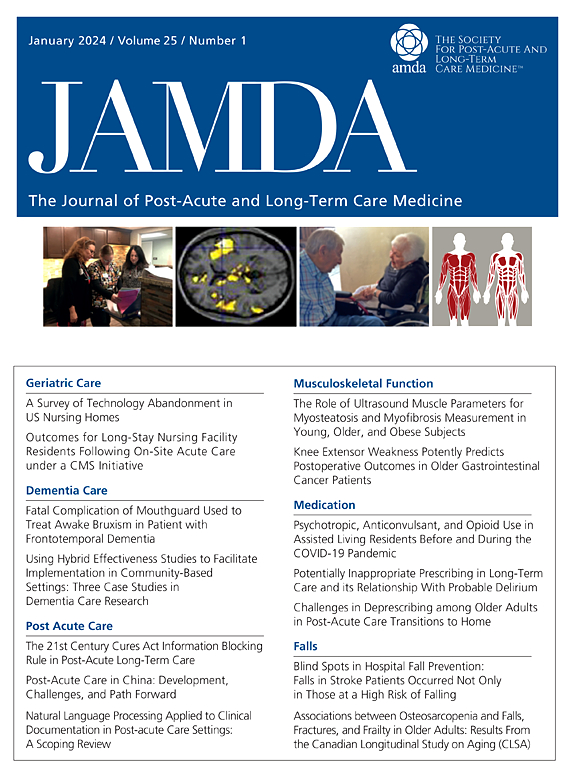Barriers and Facilitators to Successful Outbreak Management of Viral Respiratory Tract Infections in Long-Term Care Facilities: A Qualitative Interview Study
IF 4.2
2区 医学
Q2 GERIATRICS & GERONTOLOGY
Journal of the American Medical Directors Association
Pub Date : 2025-04-15
DOI:10.1016/j.jamda.2025.105575
引用次数: 0
Abstract
Objectives
Effective management of COVID-19 and influenza outbreaks in nursing homes (NHs) depends on preparation by the NH organization and the rightful execution of infection prevention and control (IPC) measures by NH staff. To be better prepared for future outbreaks and pandemics, we need a better understanding of barriers and facilitators to the execution of measures. This study aims to investigate which barriers and facilitators were perceived by Dutch NH staff during the execution of IPC measures to control outbreaks of COVID-19 and influenza in the COVID-19 pandemic end stage.
Design
Qualitative interview study.
Setting
Nursing homes where COVID-19 and/or influenza outbreaks (defined as at least 2 confirmed cases on an NH unit) occurred between February 2023 and April 2023.
Methods
We monitored 24 COVID-19 and influenza outbreaks in 14 Dutch NH organizations in the pandemic end stage. Purposive sampling was used to select a variety of outbreaks for more extensive monitoring, including qualitative interviews with NH staff involved in the management of the outbreak. During the interviews, participants reflected on the management of monitored outbreaks as well as previous outbreaks. Interview transcripts were thematically analyzed to identify determinants of IPC strategy execution.
Results
Determinants of IPC execution were clustered according to themes: motivations and attitudes; appropriateness of measures; guidance and cooperation of NH staff; communication; knowledge and skills; architectural features of the NH location; and availability of resources.
Conclusions and Implications
The current study provides in-depth insight into which determinants facilitated and impeded IPC execution during COVID-19 and influenza outbreaks pandemic end stage. These findings may help NHs to better prepare for the management of future outbreaks and pandemics, and provide insights into what determinants to consider for developing IPC strategies.
长期护理机构中病毒性呼吸道感染暴发管理成功的障碍和促进因素:一项定性访谈研究。
目的:疗养院(NHs) COVID-19和流感疫情的有效管理取决于NH组织的准备工作和NH工作人员正确执行感染预防和控制(IPC)措施。为了更好地应对未来的疫情和大流行,我们需要更好地了解执行措施的障碍和促进因素。本研究旨在调查在COVID-19大流行末期,荷兰NH工作人员在执行IPC措施以控制COVID-19和流感爆发期间,认为哪些障碍和促进因素。设计:定性访谈研究。环境:2023年2月至2023年4月期间发生COVID-19和/或流感疫情(定义为在NH单位至少发生2例确诊病例)的养老院。方法:对14个荷兰NH组织在大流行末期发生的24起COVID-19和流感疫情进行监测。有目的抽样用于选择各种疫情进行更广泛的监测,包括与参与疫情管理的国家卫生组织工作人员进行定性访谈。在访谈中,与会者反映了对监测到的疫情的管理以及以前的疫情。对访谈记录进行主题分析,以确定IPC策略执行的决定因素。结果:IPC执行的决定因素按主题聚类:动机和态度;措施的适当性;NH工作人员的指导与配合;沟通;知识和技能;NH地区的建筑特色;以及资源的可用性。结论和影响:目前的研究深入了解了在COVID-19和流感疫情大流行末期,哪些决定因素促进和阻碍了IPC的执行。这些发现可能有助于NHs更好地为管理未来的疫情和大流行做好准备,并为制定IPC战略考虑哪些决定因素提供见解。
本文章由计算机程序翻译,如有差异,请以英文原文为准。
求助全文
约1分钟内获得全文
求助全文
来源期刊
CiteScore
11.10
自引率
6.60%
发文量
472
审稿时长
44 days
期刊介绍:
JAMDA, the official journal of AMDA - The Society for Post-Acute and Long-Term Care Medicine, is a leading peer-reviewed publication that offers practical information and research geared towards healthcare professionals in the post-acute and long-term care fields. It is also a valuable resource for policy-makers, organizational leaders, educators, and advocates.
The journal provides essential information for various healthcare professionals such as medical directors, attending physicians, nurses, consultant pharmacists, geriatric psychiatrists, nurse practitioners, physician assistants, physical and occupational therapists, social workers, and others involved in providing, overseeing, and promoting quality

 求助内容:
求助内容: 应助结果提醒方式:
应助结果提醒方式:


